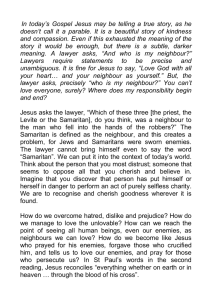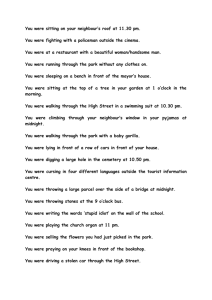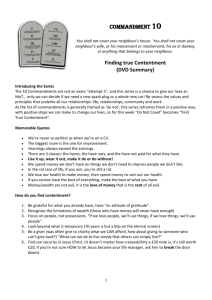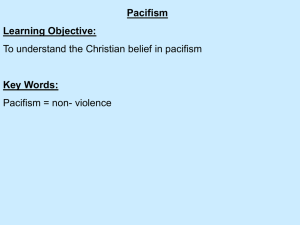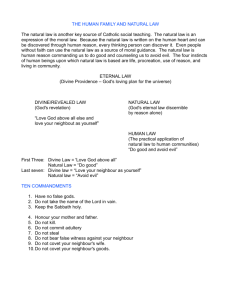1 - Middle Temple
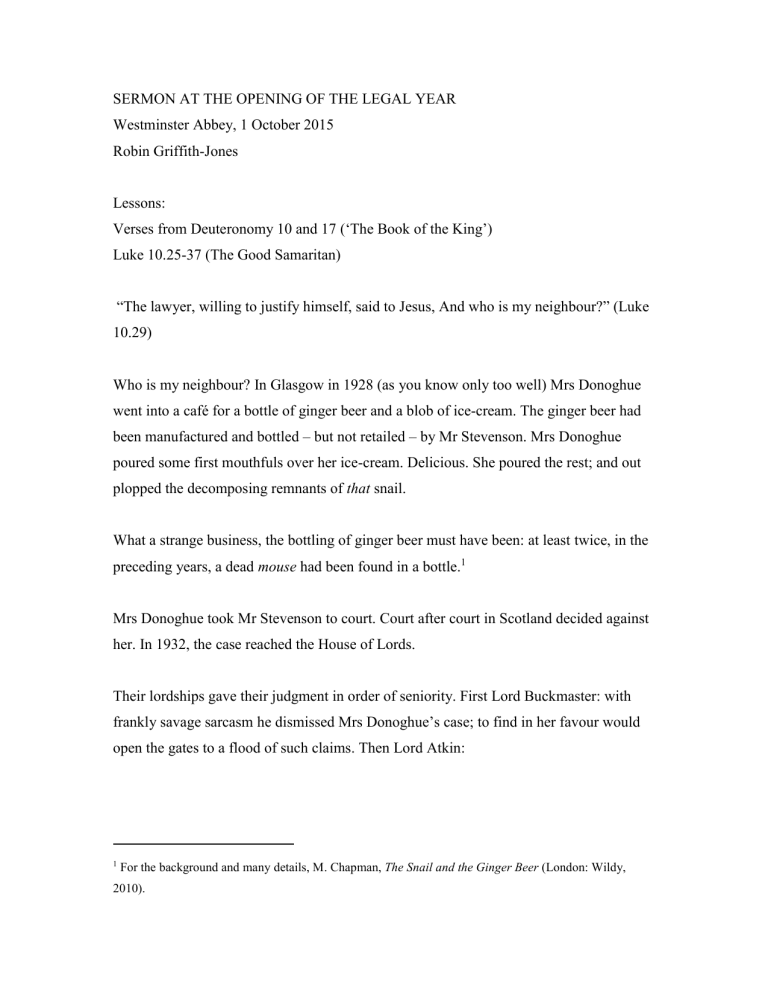
SERMON AT THE OPENING OF THE LEGAL YEAR
Westminster Abbey, 1 October 2015
Robin Griffith-Jones
Lessons:
Verses from Deuteronomy 10 and 17 (‘The Book of the King’)
Luke 10.25-37 (The Good Samaritan)
“The lawyer, willing to justify himself, said to Jesus, And who is my neighbour?” (Luke
10.29)
Who is my neighbour? In Glasgow in 1928 (as you know only too well) Mrs Donoghue went into a café for a bottle of ginger beer and a blob of ice-cream. The ginger beer had been manufactured and bottled – but not retailed – by Mr Stevenson. Mrs Donoghue poured some first mouthfuls over her ice-cream. Delicious. She poured the rest; and out plopped the decomposing remnants of that snail.
What a strange business, the bottling of ginger beer must have been: at least twice, in the preceding years, a dead mouse had been found in a bottle.
1
Mrs Donoghue took Mr Stevenson to court. Court after court in Scotland decided against her. In 1932, the case reached the House of Lords.
Their lordships gave their judgment in order of seniority. First Lord Buckmaster: with frankly savage sarcasm he dismissed Mrs Donoghue’s case; to find in her favour would open the gates to a flood of such claims. Then Lord Atkin:
1 For the background and many details, M. Chapman, The Snail and the Ginger Beer (London: Wildy,
2010).
“The rule that you are to love your neighbour becomes in law, You are not to injure your neighbour. And the lawyer’s question” – put to Jesus himself, – “Who is my neighbour, receives a restricted reply. You must take reasonable care to avoid acts or omissions which you can reasonably foresee would be likely to injure your neighbour. Who, then, in law is my neighbour?” 2
What a remarkable approach to a judgment. Lord Atkin starts with an ancient biblical command (Leviticus 19.18), with Jesus, and with the duty to love. No wonder Lord Atkin must refine his terms, and ask how a lawyer will read the commandment. For no law – however fervent its exhortations may be – can legislate for love.
3
How many judges in our own day, I wonder, would set up their judgment in such terms.
In a famous dictum, centuries before, Sir Matthew Hale had declared, “Christianity is part
[or parcel ] of the laws of England.”
4
The motto was already in retreat in the early 20 th century. Lord Sumner had tried, before Donoghue v . Stevenson, to hit Hale’s maxim over the pavilion and out of the ground: “My Lords, the phrase ‘Christianity is part of the law of England’ is really not law; it is rhetoric. ‘Thou shalt not steal’ is part of our law... But
‘Thou shalt love thy neighbour as thyself’ is not part of our law at all.” 5
2 AC 562 at 580 HL
3 Lord Atkin was not casual, in his reference to the words of Jesus. In 1931 he had delivered a lecture at
King’s College, London on just such a theme, with reference to Jesus’ words in Matthew 7.12: ‘I doubt whether the whole law of tort could not be comprised in the golden maxim to do unto your neighbour as you would that he should do unto you.’ See Castle, R., ‘Lord Atkin and the Neighbour Test’, (2003) 5
Ecclesiastical Law Journal 33 .
4 1 Ventris 293, 3 Keb 607. Hale, on blasphemy: “Such wicked blasphemous words were not only an offence to God and religion, but a crime against the laws, state and government. For to say, religion is a cheat, is to dissolve all those obligations whereby the civil societies are preserved, and Christianity is parcel of the laws of England; and therefore to reproach the Christian religion is to speak in subversion of the law.”
5 Bowman v Secular Society [1917] AC 406.
And we have been in retreat, it seems, ever since. From this side of the sacrarium steps, we want to reveal, for all to see, the Church’s life and teaching as the foundation and girders of English life and law. It is amnesiac and irrational to inhabit the building of our polity and yet to deny its reliance on Christendom. It is hardly a fluke and certainly a blessing that in “tone” English law and English Christianity have been so well matched: incremental, gradualist, self-reflective, little given to grand abstract formulae. Perhaps it is here that we in the Church will eventually rest our claims to the attention and the affection of modern Britain and of its law.
This is not yet to ask what difference such general acknowledgement would make, either to the Church or to the administration of the law. But perhaps a body so foundational to
England’s past might earn thereby some more respectful attention when she speaks about the present. Wisdom hard-won and so fruitfully applied over centuries would, we hope, not be lightly thrown aside.
Look at all those centuries past. Look at Archbishop Stephen Langton, unsung hero of
Magna Carta, in exile for years, developing in the schools of Paris his theory of a biblical, covenantal kingship which on his return to England he sought to realise in the Great
Charter itself. Magna Carta was to be the Deuteronomy of England. Look at Richard
Hooker, my predecessor, Master of the Temple in the 1580s, looking for an expansive, generous view of the law that should govern a polity at once both ecclesiastical and civil.
And look round his congregation, among the Common Law lawyers, with their pens and paper in hand, gripped by his vision of a stable, slowly evolutionary absorption of example and precedent – and see there, way back beyond the grand Benchers’ pews, the young, attentive figure of Edward Coke.
How fitting, then, that the present Archbishop of Canterbury spoke powerfully at
Runnymede this summer. He spoke of Langton, of Alphege, Anselm, Becket, giants of
Canterbury. Dr Welby has no doubt of the Church’s ongoing calling, to the principled and active betterment of society as a whole, realising the rights that are enshrined both in our legal system and in the inherent worth of all humans as children of God.
(These anniversaries are a rum do. Runnymede this summer was like a giant village fete,
Glastonbury for the establishment. It was lovely. And within hours it had been swept away by coverage of the next anniversary: Waterloo. That can be more tricky, of course.
In 1965 there were large preparations afoot for the 150 th
Anniversary of Waterloo. A careful letter was sent to the French Ambassador in London, hoping that His Excellency would be able to attend at least some of the commemorations. His Excellency replied with consummate good grace. How sorry he was that he would have no time to come to anything. Sadly, he was simply too busy – preparing the celebrations, for 1966, of the
Battle of Hastings.)
But we in the Church are not winning. Each generation comes to its ethical ideals in the terms of language and thought that it has available. Later generations may acknowledge with gratitude the insights of the past, and may well treasure principles of its own closely analogous or identical to those long-since attained in the language of the past. But we, these successors, will still need and seek to reach those principles in our own terms along the particular routes opened by our own vocabulary of thought and belief.
And yes, we may in the Church look on, disheartened that so much has in fact been appropriated of our legacy with neither our part in it acknowledged nor a secular grounding provided for our own time. ’Twas ever thus? We may owe the whole idea of universal human rights to Platonic universals; but few of us now ground such rights in a sustained coherent Platonism. Kant may himself have seen that his moral system was unsustainable without the subject of the summum bonum or the prospect of our own perfection in immortality. But the world when it followed Kant all too easily left his God, beyond all knowledge or evidence, behind. A cynic would yap without sympathy: “Yes, that’s right, we are all parasites, not Platonists; we are cuckoos in the Kantian nest, not advocates for rational theology; we have taken what we value from your Christendom and simply made it, with good reasoning or bad, our own. Get over it.”
Lord Sumner, of course, had a powerful point when he mocked Sir Matthew Hale’s dictum. But was he missing a larger point?
It would be mere folly to rely on love to keep public order.
But no law will keep that order from dissolution without some such coagulant as love, decency, sympathy, neighbourly care.
To elevate all systems of social order to an airy reliance on neighbourliness would be recipe for chaos: the strongest would take all they could get and the vulnerable would go to the wall.
But to reduce all systems of social wellbeing to the law’s letter and its sanctions would be recipe for cold, grasping calculation: the strongest would take all they could get away with, and the vulnerable would still go to the wall.
We need in all of us who are called to obey the law and above all in all you who serve it
– the love of our neighbour. The lawyer asked Jesus, “Who” – out there – “is my neighbour?” Jesus answered a more pointed question: “To whom was the lawyer called to be – himself, in his own life and work – a neighbour?” The answer can still be unsettling.
Some people are readily loved, they call out for our care and service; others – as you see all too often in your daily work and as we sometimes see in ours – test tolerance and sympathy to the limit. We do still, on both sides of these sanctuary steps, have much in common.
A couple of questions, as we pass. Is it only Christianity that can animate the body politic with neighbourly care and service? Far from it. Judaism, steeped in law and its observance, was already famous 2,000 years ago for the care the Jews took of their communities. “Love thy neighbour” is a Jewish law. And eventually, beyond the horrors of the present day, the humane, warm strands of Islam will, we can only hope, emerge and shine in the sunlight.
But again: must it be religion at all, that fuels our care for others and makes us a genuine, community? No. But it is striking how hard it still is to provide, without religion – without a God whose children we all are – a compelling ground for universal human
worth and human rights. We can stipulate such rights; and those more earnest Kantians have for 200 years established the rights of potentially, possibly or actually rational and mature moral agents. But this does leave, exposed to terrible chill winds, those who will never – or never again – be such agents; and it is just those for whom the law and the neighbour alike take special care.
**
Almost all of us here this morning serve the law. Some of you may see yourselves as serving the supreme Judge, God of all justice; others, as serving justice itself; others, as simply doing, case by case, what is just. Some will invoke God as the source and inspiration of all love; others acknowledge the love of neighbour as simply proper to humankind. All of you in your work acknowledge a cause higher than yourselves, your own interests or any human partiality. Perhaps we are more nearly Platonists than at first sight appears.
Gathered here, we can together acknowledge our shared service of a justice greater and more enduring than we are, the depth of a principle at once ancient and for ever new. And here and now, if ever or anywhere, we can sense the presence of the judge of all, before whose sure, all-seeing and merciful tribunal we ourselves will one day as defendants stand.
“Who is my neighbour?” The answering story of Jesus still inspires and animates us, in the warmth and generosity and care of its Samaritan hero. In this place and this service above all others, Jesus’ consequent command can still inspire and animate us too. The command issued to the lawyer, heard by Lord Atkin and still addressed to all of us in the
Church and to all of you who, in your high calling, serve the law: “Go, and do likewise.”
